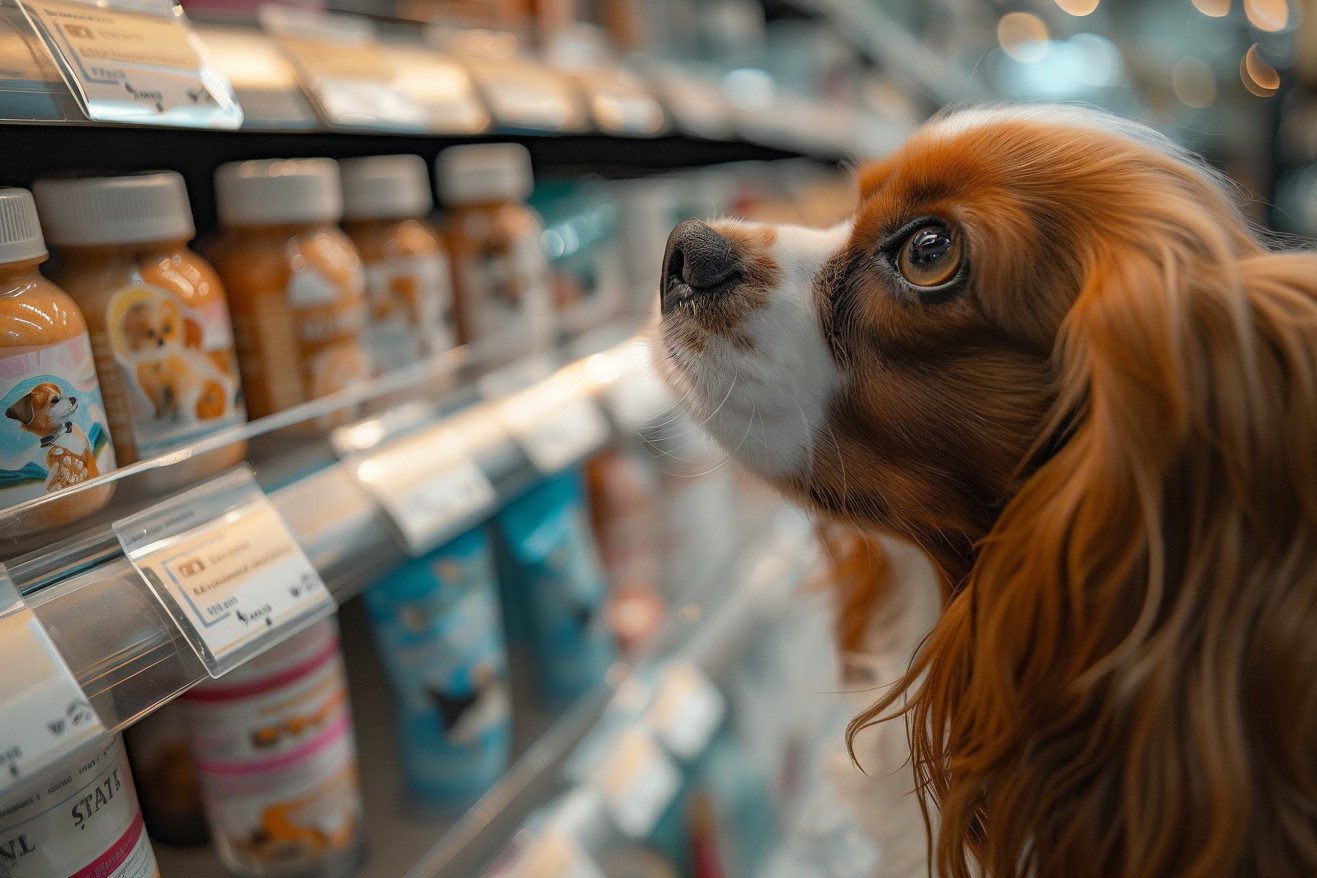Can Dogs Have Sorbitol? What You Need to Know
15 February 2024 • Updated 14 February 2024

Sorbitol is an ingredient in many different items, but can your dog have it? While sorbitol is generally safe for dogs in small amounts, like what’s found in dog toothpaste or certain treats, it can cause gastrointestinal problems like diarrhea if consumed in large quantities. It’s not as dangerous as xylitol, but it should still be given in moderation.
To help you better understand whether or not sorbitol is safe for dogs, this article will go over a number of studies found in veterinary science and toxicology reports, as well as information from regulatory bodies like the FDA.
Together, these studies and reports will give you a better understanding of how sorbitol impacts dogs, from its use in dental care products to its inclusion in dog food. Knowing this information will help you decide whether or not you want to give your dog products that contain sorbitol.
Can dogs have sorbitol?
Sorbitol in Your Dog’s Dental Products
Sorbitol is a sugar alcohol that occurs naturally in many fruits and is also a common ingredient in dog dental products, including toothpaste and dental chews. While sorbitol is generally considered safe for dogs, Four Leaf Rover explains that it is mainly used to make the toothpaste taste better without promoting cavities.
That said, while sorbitol is used to make the toothpaste more palatable, it can cause stomach upset in some dogs and can even make Irritable Bowel Syndrome (IBS) symptoms worse.
When it comes to dog dental care, brushing with a dog-formulated toothpaste is the best option, as 4-Legger points out. However, it’s important to be selective about the products you use.
Unlike xylitol, which is poisonous to dogs, sorbitol is used in dog toothpaste for flavor and not for its antibacterial properties. As a result, natural ingredients like ground sea salt, baking soda, and peppermint essential oils are recommended as safer alternatives for homemade toothpaste recipes to help support dogs’ dental health.
It’s important to pay attention to the ingredients in your dog’s dental products. While the taste of products that contain sorbitol may be appealing to pet parents, it’s important to consider the potential for gastrointestinal upset to ensure you’re providing the best care for your dog.
How Sorbitol Affects Dog Digestion
The canine digestive system is different from the human digestive system, and this extends to how sugar alcohols like sorbitol are metabolized. While dogs can metabolize sorbitol, it is absorbed more slowly than other sugars.
A study in the Journal of Animal Science found that dogs fed diets containing sorbitol blends had lower glycemic and insulinemic responses, which means that the impact on blood sugar was less. However, sorbitol can still cause digestive upset in dogs when consumed in large amounts because it is metabolized slowly by the liver.
When dogs consume too much sorbitol, they can experience side effects like diarrhea, abdominal pain, and dehydration. Studies have shown that sorbitol is a laxative in dogs because it is rapidly absorbed into the bloodstream, and it can lead to weight gain and dental problems if it is not properly controlled.
To control how much sorbitol your dog consumes, it’s important to read product labels and make sure that your dog’s diet is well-rounded and not too high in sorbitol. Feeding your dog a well-rounded diet and working with your veterinarian can help you make sure that your dog’s diet contains the right amount of sorbitol to support their digestive health.
Regulatory Standards and Safety Guidelines for Sorbitol in Dog Products
Regulatory agencies like the U.S. Food and Drug Administration (FDA) are responsible for ensuring the safety and quality of ingredients in pet foods, including sorbitol. Since sorbitol is used in both human and pet foods, there are regulatory standards that must be met to ensure the safety and nutritional value of its use in dog products.
For example, the FDA requires that food additives like sorbitol are generally recognized as safe and meet certain specifications. This is further supported by Anton Beynen’s research, which found that the typical application rates of sorbitol in pet foods are safe.
In addition to the FDA, the Association of American Feed Control Officials (AAFCO) offers guidance on pet food regulations. AAFCO’s standards are designed to ensure that pet food is safe and labeled accurately.
In the case of sorbitol, this means that pet owners need to be aware of its presence in dog products and understand how it’s listed. Manufacturers should also ensure that the sorbitol content in their products doesn’t exceed the maximum levels determined by good manufacturing practices.
Pet owners should be aware of these standards when choosing products that contain sorbitol for their dogs to ensure their safety. In doing so, pet owners can help ensure the health of their canine companions and help to further our understanding of how different ingredients are metabolized in dogs to support their overall health.
How Dogs Metabolize Sorbitol
The story of sorbitol’s metabolism in dogs is a long and winding one that has a lot to do with metabolism and the effects on health.
As a sugar alcohol, sorbitol is absorbed much more slowly than other sugars, which means it has a low impact on blood sugar levels and is safe for diabetic dogs, according to a study in PubMed. This slow absorption rate also means that sorbitol is less likely to cause a sudden spike in blood sugar, which is especially important for the management of diabetes in dogs.
But that’s not the end of the story when it comes to the biological effects of sorbitol. In dogs with diabetes, researchers have found that high levels of sorbitol are associated with complications like cataracts because sorbitol accumulates in the lenses faster than the dogs can metabolize it, according to a study in PubMed.
This accumulation happens because dogs, like people, use the polyol pathway to convert glucose to sorbitol when blood sugar levels are high. Under normal circumstances, the body converts sorbitol to fructose, which is then used to produce energy, but when levels are too high, it can lead to complications.
This is important for dog owners to know, especially when it comes to making dietary choices for dogs with health issues like diabetes. As with many things, the key is moderation because consuming too much sorbitol can lead to potential weight gain and health issues.
With this information, dog owners can make educated decisions about the products they choose and how they manage their dog’s diet to ensure they have the healthiest and happiest life possible.
How to Stay Safe Around Sorbitol: What to Do if Your Dog Eats Sorbitol
Dogs who have ingested sorbitol, a sugar alcohol found in a variety of household items, are in danger. While not as poisonous as xylitol, sorbitol can be found in sugar-free gums, baked goods, certain beers, and medications like cough syrups and laxatives, according to Cuteness. While sorbitol can cause stomach upset, it is not considered poisonous.
Pet parents should be aware of symptoms like diarrhea, bloating, and gas, which are signs of sorbitol ingestion. If these symptoms last for more than a day or if a dog has ingested a large amount of a product that contains sorbitol, it’s important to take them to the vet right away.
To avoid emergencies, it’s important to pet-proof your home. Keeping items that contain sorbitol in a place that’s out of reach will help to prevent accidental ingestion.
If you think your dog has ingested something, keep a close eye on them. If their symptoms get worse or if you’re unsure of how much they’ve ingested, take them to the vet right away to make sure that they’re safe and healthy.
Conclusion: Is Sorbitol Safe for Dogs?
In conclusion, sorbitol can be considered a safe sugar alcohol for dogs as long as it is used responsibly and in moderation in their diets and other products. We have discussed its use in dental care products, and the need to balance its use with the potential for digestive issues.
Studies, as noted by the Journal of Animal Science and PubMed, have shown that while sorbitol has a lower glycemic response, overconsumption can lead to digestive and metabolic issues.
Regulatory standards by the FDA and AAFCO help ensure that sorbitol and other ingredients are used safely in pet products and that any potential risks are clearly labeled for pet owners. These standards are important to ensure that pet owners can make informed decisions that will keep their pets safe and healthy.
As pet parents, it is our responsibility to make sure that the products we use are contributing to our pets’ health in a positive way. This includes pet-proofing our homes and making sure that we are aware of any potential toxins that our pets could accidentally ingest.
In the end, the safety of sorbitol for dogs is a part of the larger idea of responsible pet ownership: taking a proactive approach to our pets’ care that is informed and driven by love for our furry friends.


